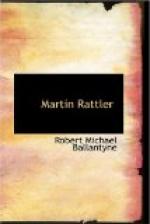Minas Geraes, the diamond district, is one of the richest provinces of Brazil. The inhabitants are almost entirely occupied in mining or in supplying the miners with the necessaries of life. Diggers and shopkeepers are the two principal classes, and of these the latter are best off; for their trade is steady and lucrative, while the success of the miners is very uncertain. Frequently a large sum of money and much time are expended in mining without any adequate result; but the merchants always find a ready sale for their merchandise, and, as they take diamonds and gold-dust in exchange, they generally realize large profits and soon become rich. The poor miner is like the gambler. He digs on in hope; sometimes finding barely enough to supply his wants,—at other times making a fortune suddenly; but never giving up in despair, because he knows that at every handful of earth he turns up he may perhaps find a diamond worth hundreds, or, it may be, thousands of pounds.
Cidade Diamantina,—the City of Diamonds,—is the capital of the province. It is a large city, with many fine churches and buildings; and the whole population, consisting of more than 6000 souls, are engaged, directly or indirectly, in mining. Every one who owns a few slaves employs them in washing the earth for gold and diamonds.
The mine of which Barney had so unexpectedly become overseer, was a small one, in a remote part of the district, situated among the mountains, and far distant from the City of Diamonds. There were only a few huts, rudely built and roofed with palm leaves, besides a larger building, or cottage, in which the Baron Fagoni resided.
“Tis a strange life they lead here,” said Barney, as he led Martin down a gorge of the mountains towards a small spot of level ground on which the slaves were at work; “a strange life, and by no means a pleasant wan; for the feedin’ is none o’ the best and the work very sevare.”
“Why, Barney, if I may judge from last night’s supper, the feeding seems to be excellent.”
“Thrue, boy, the Baron Fagoni feeds well, bekase he’s the cock o’ the roost; but the poor Naygurs are not overly well fed, and the critters are up to their knees in wather all day, washing di’monds; so they suffer much from rheumatiz and colds. Och, but it’s murther entirely; an’ I’ve more than wance felt inclined to fill their pockets with di’monds and set them all free! Jist look, now, there they are, hard at it.”
As he spoke they arrived at the mine. The ground in the vicinity was all cut up and dug out to a considerable depth, and a dozen Negroes were standing under a shed washing the earth, while others were engaged in the holes excavating the material. While Martin watched them his friend explained the process.




